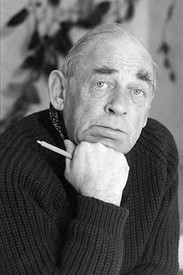Alvar Aalto
 Aalto, Alvar (ŏl'vär äl'tō) , 1898–1976, Finnish architect and furniture designer. Aalto is considered one of the foremost architects of the 20th cent. Most of his designs were made in collaboration with his wife, Aino Marsio, the celebrated furniture designer, until her death in 1949. Aalto's work adapted Finnish building traditions to modern European techniques and to the specific function of the structure in boldly expressive style. His designs for the municipal library at Viipuri (1927–35; destroyed when it was made part of Russian territory in 1940) and the tuberculosis sanitarium at Paimio (1929–33) were outstanding functionalist works. He gained international fame by his remarkable designs for laminated-wood furniture and by his plans for the Finnish pavilions at the expositions in Paris (1937) and New York (1939). Appointed professor at the Massachusetts Institute of Technology in 1940, he designed there the serpentine Baker House (1947–48). After World War II he was active in reconstruction in Finland. His major postwar works included a number of striking civic buildings in Helsinki, the Maison Carré in Paris (designed in collaboration with Elissa Makkinheimo, his second wife), and the Wolfsburg cultural center in Germany.
Aalto, Alvar (ŏl'vär äl'tō) , 1898–1976, Finnish architect and furniture designer. Aalto is considered one of the foremost architects of the 20th cent. Most of his designs were made in collaboration with his wife, Aino Marsio, the celebrated furniture designer, until her death in 1949. Aalto's work adapted Finnish building traditions to modern European techniques and to the specific function of the structure in boldly expressive style. His designs for the municipal library at Viipuri (1927–35; destroyed when it was made part of Russian territory in 1940) and the tuberculosis sanitarium at Paimio (1929–33) were outstanding functionalist works. He gained international fame by his remarkable designs for laminated-wood furniture and by his plans for the Finnish pavilions at the expositions in Paris (1937) and New York (1939). Appointed professor at the Massachusetts Institute of Technology in 1940, he designed there the serpentine Baker House (1947–48). After World War II he was active in reconstruction in Finland. His major postwar works included a number of striking civic buildings in Helsinki, the Maison Carré in Paris (designed in collaboration with Elissa Makkinheimo, his second wife), and the Wolfsburg cultural center in Germany.
- Columbia University Press, Encyclopedia